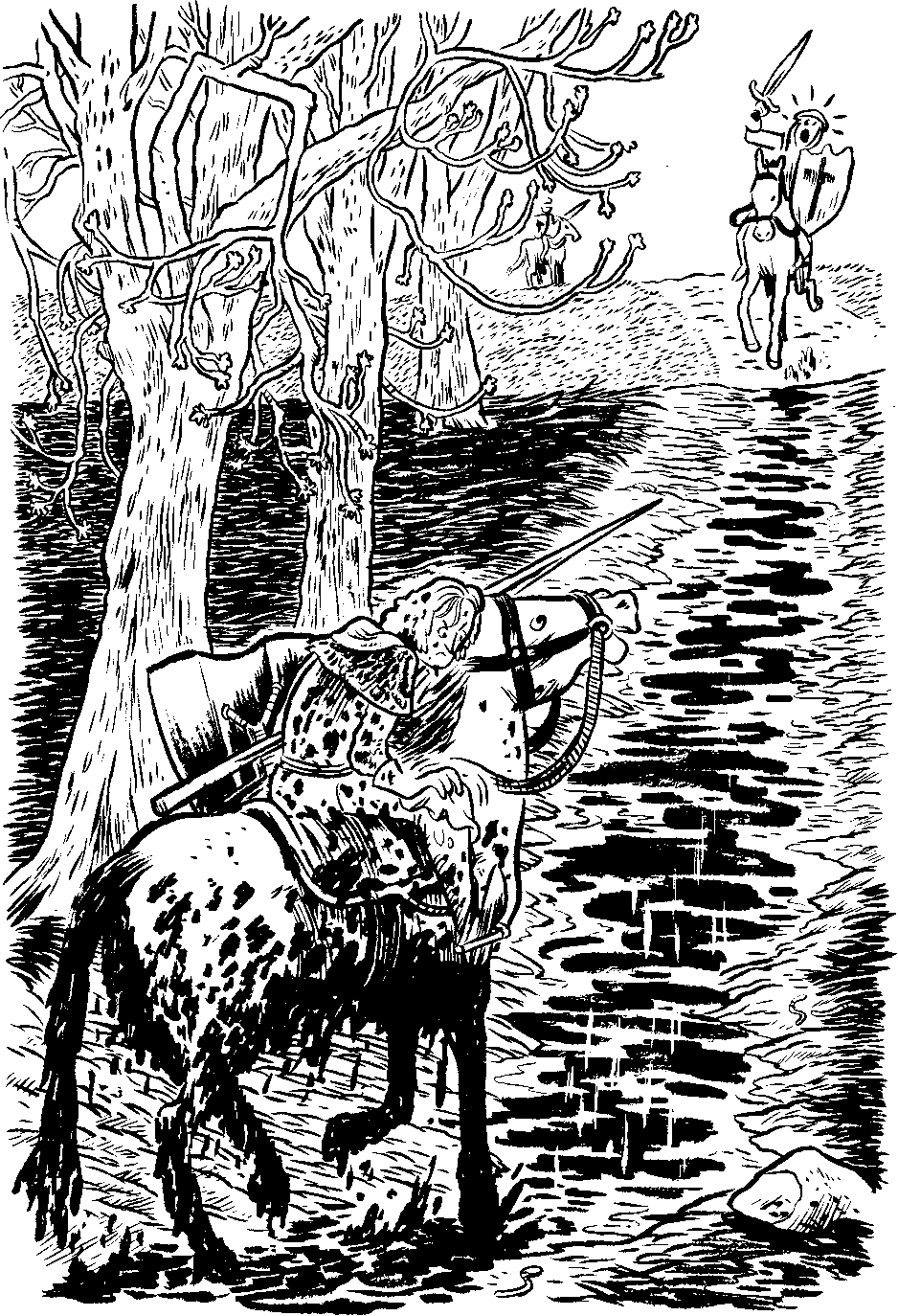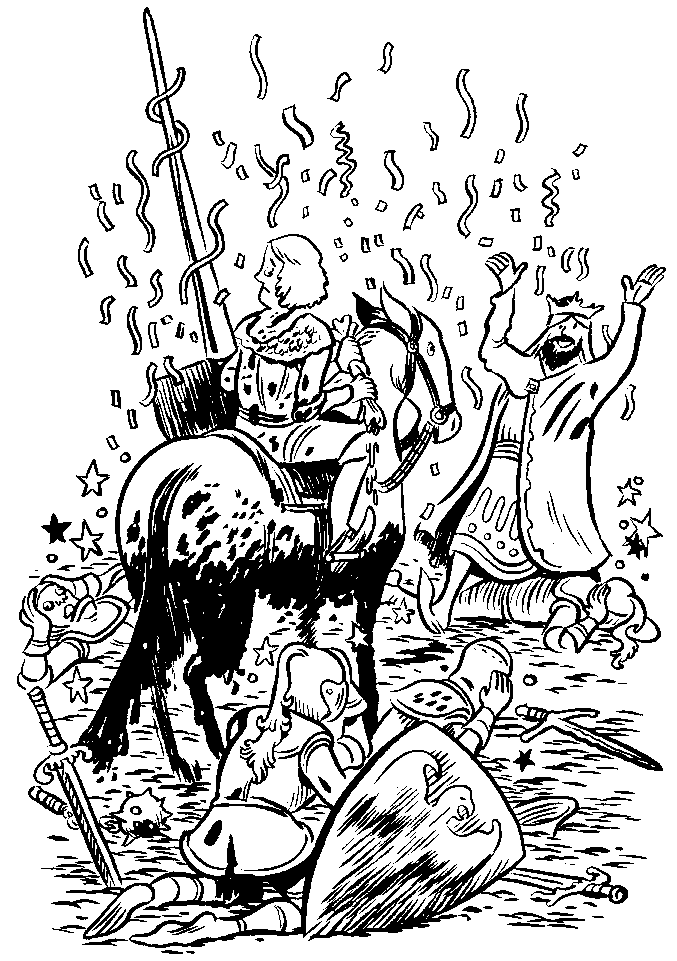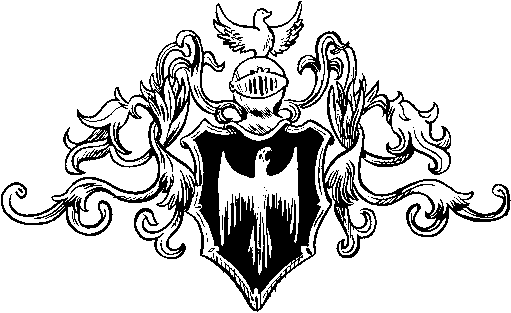The Adventures of Sir Lancelot the Great
Read The Adventures of Sir Lancelot the Great Online
Authors: Gerald Morris
Gerald Morris
Illustrated by Aaron Renier
H
OUGHTON
M
IFFLIN
C
OMPANY
B
OSTON
2008
Copyright © 2008 by Gerald Morris
Illustrations copyright © 2008 by Aaron Renier
All rights reserved. For information about permission
to reproduce selections from this book, write to Permissions,
Houghton Mifflin Company, 215 Park Avenue South, New York, New York 10003.
The text of this book is set in Post Mediaeval.
The illustrations are brush and ink.
Library of Congress Cataloging-in-Publication Data
Morris, Gerald, 1963-
The Adventures of Sir Lancelot the Great / written by Gerald Morris.
p. cm.
Summary: Relates tales of Sir Lancelot, the bravest knight in King Arthur's court.
ISBN-13: 978-0-618-77714-3
1. Lancelot (Legendary character)âLegends. 2. Arthurian romancesâAdaptations. [1.
Lancelot (Legendary character)âLegends. 2. Knights and knighthoodâFolklore.
3. FolkloreâEngland.] I. Title.
PZ8.1.M8268Ad 2008
[398.20942'02]âdc22
2007041167
Manufactured in the United States of America
MP 10 9 8 7 6 5 4 3 2 1
Chapter 1F
OR
S
TEPHEN AND
K
ATHERINE
The Knight in Shining Armor

Many years ago, the storytellers say, a great king brought justice to England. The king's name was Arthur, and he surrounded himself with brave knights in shining armor, whom he sent out to defend the helpless and protect the weak. They rescued damsels in distress, slew troublesome dragons, and fought against wicked knights who used their weapons to oppress the defenseless. The wicked knights were called "recreants"â
which means something like "cowardly bullies"âand one by one they were driven from England. In this way, King Arthur brought peace to the land, and tales of his court at Camelot were told wherever people met.
Indeed, tales of King Arthur and his knights in shining armor were even told across the sea, in France, where they came to the ears of a young prince named Sir Lancelot. Sir Lancelot had just been knighted by his father, King Ban of Benouic, and although he was very young, he showed great promise in the knightly arts. When Sir Lancelot heard about King Arthur's knights, nothing would satisfy him but to join their number.
"I must go to England, to King Arthur," Sir Lancelot told King Ban, "for his knights are the greatest knights of all!"
"Are they?" asked King Ban.
"Yes, Father. They have the bravest hearts, the
noblest souls, and the shiniest armor in all the world."
"Shiniest armor?" repeated King Ban.
"Everyone says so," Sir Lancelot assured his father. "I wish to go to Camelot!"
Ban was a wise king, and an even wiser father, so he replied, "Very well. Go to Camelot. You should do well there, for you already have a brave heart and a noble soul, besides being very skilled with your weapons. You have my blessing."
"Thank you, Father," Sir Lancelot replied gratefully. "But ... er ... Father?"
"Yes, Lancelot?"
"You didn't say anything about my armor. Is it not shiny enough?"
A few days later, Sir Lancelot led his great horse onto a ship bound for England. He carried a long lance in one hand, and his mind was alive with
dreams of glory. Arriving in England, he set out at once for Camelot, stopping only to practice with his sword and lance, to polish his armor, and to take short naps after lunch. Strictly speaking, afternoon naps were not required for knights, but Sir Lancelot found them refreshing.
On his third day, just as he began to think he should be nearing Camelot, a heavy spring rain set in. Rain is never enjoyable for someone in armor. It makes a deafening noise on the metal helmet and always leaks in at the neck and shoulders. To Sir Lancelot, though, this rain was even more distressing, because it turned the paths to mud, and in no time his armor was splashed all over with dirty spots.
When at last the rain stopped, Sir Lancelot turned his attention to his spattered appearance. Moving his lance to his left arm, he drew a towel from his saddlebags and began scrubbing at his
armored legs. Soon he was absorbed in the task, paying no attention to where his horse was taking him.

Just then, the loud drumming of a horse's hooves disturbed him from his polishing. Sir Lancelot looked up to see a knight in armor bearing down on him with his spear leveled. Realizing that this must be one of those recreant knights he'd heard of, Sir Lancelot readied himself for battle. He had no time to shift his lance to his right arm, so he met the knight's charge left-handed, popping his attacker very neatly from his saddle.
"There, now," Sir Lancelot said to the fallen knight. "Stop being so recreant and attacking people when they're busy." With that, he turned back to his armor.
A moment later, though, Sir Lancelot was interrupted again, by a different charging knight. "Bother," said Sir Lancelot, knocking the second
knight from his horse. "Please go away. Can't you see I'm occupied?"
When a third knight charged just a few seconds later, Sir Lancelot began to feel annoyed. He was only halfway done with one leg, and at this rate would never get himself cleaned up. "Serves you right," he said to the third challenger after unhorsing him like the others. "You were very rude, you know."
In all, Sir Lancelot defeated sixteen knights, and was glad that English recreant knights attacked one at a time. If they had charged all at once instead of taking turns, he probably would have had to put down his towel. As it was, in between knights he was able to wipe the mud from one leg and half his breastplate.
After the parade of knights had ceased, though, a new sound disturbed Sir Lancelot's labors. Looking up, Sir Lancelot was astonished to see that he was surrounded by a crowd of people, all cheering wildly. As he stared, a smiling man in a long red cape walked up to where Sir Lancelot sat. "My goodness," said Sir Lancelot. "Where did all of you come from?"

"Unknown knight, I congratulate you!" the smiling man said. "Never have I seen such skill. You have won our tournament!"
"Tournament?" repeated Sir Lancelot blankly. "Oh! So that's why those fellows kept attacking me. They weren't recreant knights at all."
"You didn't know you were in a tournament?" the smiling man asked.
"I wasn't paying very close attention," explained Sir Lancelot. "I was busy, you see."
The man smiled more broadly. "You overcame my greatest knights without paying attention? Please, tell me your name, Sir Knight!"
"I am Sir Lancelot, just come to this land from France."
"I am delighted to meet you," the man said. "You know, I thought you must be from another land. There aren't very many left-handed knights, and I thought I knewâ"
"Oh, I'm not left-handed," said Sir Lancelot.
The man's eyes widened. "But you used your left hand to unhorse all those knights!"
"My right hand was busy."
"Sir Lancelot," the man said earnestly, "I beg you to join my court, for I have never seen such skill as yours!"
"That is most kind of you, sir," replied Sir Lancelot, "but I'm afraid I cannot accept your generous offer." The man looked so disappointed that Sir Lancelot added, "Please don't be sad. It's just that I've come all this way to join King Arthur's court."
At that, the man began to laugh. "But I
am
King Arthur!"
Sir Lancelot stared for a moment, then cried out, "Oh, no! But this is awful!"
"Awful? But why?"
Sir Lancelot gestured at himself. "Look at me! I'm covered with mud! And I
did
want to make a favorable first impression!"
The Fastest Knight in England

In no time at all, the storytellers say, Sir Lancelot became the most famous of all King Arthur's knights in shining armor. No other knight rescued so many damsels in distress or slew so many dragons or overcame so many recreant knights or, for that matter, kept his armor so tidy. He performed so many great deeds that he soon became known as Sir Lancelot the Great. Minstrels sang
songs of his adventures, damsels sighed when he passed by, boys playing knights all wanted to be Sir Lancelot, and young knights dreamed of one day defeating Sir Lancelot, because whoever did that, they thought, would take his place as the greatest knight in England.
That last part soon got to be a problem. Everywhere Sir Lancelot went, knights were waiting to challenge him, all hoping to win fame and glory with one battle. Sir Lancelot defeated them all, but fighting every knight he met grew rather tiresome. So, when he rode out on a quest, he chose lonely paths. This was why he was riding alone through a quiet forest one day when he heard an unexpected sound.
"WAAAAAH!"
It was a damsel in distress. When you ride out on enough quests, you get to know that sound. Sir Lancelot turned toward the wailing and soon
came to a woman sitting alone beneath a great oak tree, crying with gusto.
"Good day, my lady," Sir Lancelot said politely. It was hard to know the right thing to say at times like this.
"WAAAAAH!" the lady said.
Sir Lancelot said, "May I be of service, my lady?"
"WOOOO-HOOOO-WAAH!"
"Can you tell me what is distressing you, my lady?"
"WAAAH! BLUH-BLUH-WOO-WAAH!"
"I'll just wait here a bit, then, shall I?"
"WIB B LE-B LIDDE R-WO -WO -HAH-WAAH!"
So Sir Lancelot sat on his horse and waited. No one can cry forever, and when at last the lady had used up all her tears, Sir Lancelot asked again, "Can you tell me what is distressing you?"
"It's my ... my fal-fal-falcon!" the lady gasped.
Now in those days, noble lords and ladies used
to train falcons to hunt for them. They kept them on leashes, then set them free to hunt small birds. A well-trained falconâthat is, one that would come backâwas quite valuable.
"What happened to your falcon, my lady?"
"It flew away! It was a gift from my husband," the woman wailed, beginning to cry again. Not all falcons were well trained.